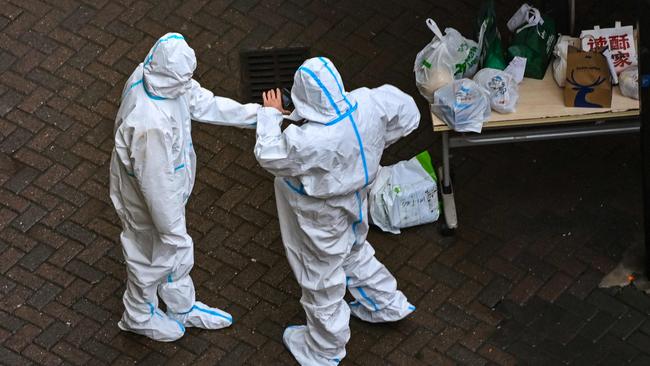
Toward the end of 2023, well after the end of the pandemic, excess deaths in the US, Australia and most Western nations remain significant, according to official figures.
In December, the Actuaries Institute of Australia said it was “not clear” what had caused “incredibly high” excess deaths in Australia, 13 per cent higher for 2022, up from zero during the pandemic. Between January and August, excess deaths were running at almost 12 per cent, equivalent to almost 12,000 deaths over and above what might have been expected, according to the ABS’s latest mortality report.
The lack of mainstream interest has fuelled speculation the Covid-19 vaccines have somehow been a cause. It’s now possible to assert in public without being cancelled that the mandated vaccines were, putting it politely, far less effective than promised at preventing transmission, severe illness or death.
One can also say the vaccines did cause injuries and in rare cases even deaths. Indeed, a survey extracted from the US Centres for Disease Control last October courtesy of Freedom of Information laws found 7.7 per cent of around 10 million Americans who took part in its “v-safe” program had sought medical help after receiving either the Pfizer, Moderna or Johnson & Johnson shots.
Demand for these vaccines has collapsed, despite official advice, in the US at least, that everyone aged six months and over should receive them. If ignoring official advice on vaccines makes someone an “anti-vaxxer”, the vast majority of Americans now fit into that category.
But it’s quite a stretch to conclude the treatments have caused mass death; rather than “safe and effective”, a more accurate slogan might have been the less appealing “mostly safe, and largely ineffective”. Some weeks ago I interviewed one of the world’s foremost epidemiologists, Stanford University scientist John Ioannidis, famous enough not to be cowed into parroting official narratives that naturally absolve authorities from causing harm.

Ioannidis, 58, has made a career out of debunking false claims, famously triggering the unravelling of the multibillion-dollar Theranos fraud in 2015. His 2005 article, Why most published research findings are false, remains among the most downloaded academic articles ever.
Ioannidis, who has published numerous studies on Covid-19, said part of the high excess deaths in fact stemmed from the success of Covid-19 vaccines in helping the old and frail live a little longer than they otherwise would have, pushing their deaths into the future.
He dismissed arguments that the Covid-19 vaccines were causing the surge in excess deaths, even if their benefits had been wildly exaggerated by their manufacturers and the public health authorities that in large part funded them.
Along with Nobel prize-winning biophysicist Michael Levitt, also at Stanford, Ioannidis said Australia’s cumulative excess deaths from early 2020 to August 2023 were in fact likely much lower than official reports suggested, in fact probably negative, at -1.9 per cent, based on their latest research.
That would put Australia among the best performers overall in terms of cumulative excess deaths among 34 developed nations (behind New Zealand, Norway, Sweden and Denmark).
Excess death calculations, he argued, have been exaggerated by overly optimistic assumptions, even if they remained staggeringly high in some nations, including worse than -12 per cent in the US.
“The age structure of the population, especially in Western countries, is becoming substantially older over time, which increases deaths,” Ioannidis explained. “And it’s unlikely that we will see the same improvement in longevity in the absence of a pandemic every year in the same rate as we were seeing in the 1980s or ’90s”. For him, the cause of staggeringly high excess deaths is not vaccines, but the Covid-19 lockdowns, which, he argues, killed more people than they saved once adjusting for the life years remaining of those who died.

Among the top 10 most cited scientists in the world, according to Boston University, Ioannidis said it was “extremely likely at a global level” that lockdowns, which most nations introduced on and off for up to two years to stop the spread of SARS-Cov2, caused a net loss of life.
“It’s possible that in some countries life years lost due to Covid were greater, but the vast majority of damage in poor countries was from the response – not only of the response in those countries but also the effects from the rich countries,” he told The Australian.
“You have disruption of health systems … no preventive care, cancer treatments being postponed, lots of people in poverty not having good healthcare, and superposed on that additional overdoses, alcohol and drug abuse, the list is long”.
The World Health Organisation has estimated hundreds of millions of people were pushed into extreme poverty by the disruptions to global trade caused by government restrictions throughout the pandemic. There was “no doubt about it”, Ioannidis said, that deaths from or with Covid-19 were among those in their 80s on average, while “deaths from the response were likely to be spread out across the whole age range”.
Ioannidis, who in March 2020 attracted criticism for suggesting the world might be overreacting to SARS-Cov2, said in hindsight lockdown measures were “tremendously damaging (and) the benefits in terms of containing the spread of the virus very limited, if any”.
The professor said he was “very much worried” the same restrictions would be enacted again for a similar pandemic, because once again “politicians would feel cornered and panic”.
“It’s one thing to win the scientific argument and it’s a very different thing to win the political one.”
It’s shocking that governments refuse to consider they might have erred throughout the pandemic. Inquiries, current and forthcoming, into Covid-19 policy in the UK, Australia and elsewhere refuse to consider the impact of lockdowns or vaccines mandates on excess deaths, which will only fuel conspiracy theories and undermine public respect for official recommendations when the next pandemic inevitably emerges.








This time two years ago the daily news was dominated by the deaths of older people in nursing homes from or with Covid-19. But today far more people are dying than expected, with barely a murmur of mainstream interest.